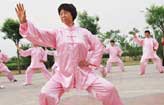Politics
Seniors to have State pensions
Updated: 2011-08-18 07:57
By He Dan (China Daily)
BEIJING - Urban and rural senior citizens will be receiving State pensions by 2015, according to a statement issued on Wednesday following an executive meeting of the State Council, China's Cabinet.
The meeting, which was presided over by Premier Wen Jiabao, discussed and endorsed the nation's 12th Five-Year Plan (2011-2015) on senior citizens.
During those five years, the number of mainland Chinese who are 60 or older will go from 178 million to 221 million and from making up 13.3 percent of the entire population to 16 percent, the statement noted.
The government will work toward ensuring that all senior citizens in both rural and urban places receive state pensions by the end of 2015.
The five-year plan also calls for improvements to the medical system that serves the elderly. It calls on hospitals to keep health records of patients who are 65 or older and arrange regular medical examinations for them.
The government also intends to continue improving the nursing services that are offered to the elderly. The five-year plan says that at least 80 percent of urban communities and half of all rural communities should provide nursing services for the elderly by the end of 2015.
Meanwhile, the government will work to ensure nursing homes contain at least 30 beds for every one thousand senior citizens in the general population.
The elderly in China now have difficulty in finding enough nursing services to meet their needs, said Yan Qingchun, deputy head of the National Working Commission on Aging's administration department.
He said there is a huge demand in the country for nursing homes for the elderly.
Yan made those remarks during a ceremony marking the release of a report that looked at the services China offered to the elderly in 2010.
Nursing homes in the mainland now only contain enough beds to house 1.59 percent of the country's elderly population. In developed countries, that ratio runs from 5 percent to 7 percent and, in developing countries, from 2 percent to 3 percent, Yan said.
Over the years, China has introduced a series of policies meant to encourage private investment in nursing homes, and the number of private nursing homes in operation has increased as a result.
Yan said China will continue to encourage the establishment of those homes.
Yan said the market for nursing services for the mainland elderly population is worth more than 3 trillion yuan ($469 billion).
The report also showed the number of China's mainland citizens who are 60 or older has risen to 178 million, and that it increased by 2.93 percent from what it had been in 2000. And the number of residents who are 65 or older reached 118.83 million by the end of 2010.
China's mainland population is rapidly growing older while its birth rate remains low. Estimates hold that citizens who are 60 or older will make up about 30 percent of the country's mainland population by 2050.
According to international standards, a country or region is considered to have an "aging society" when the number of citizens there who are 60 or older make up 10 percent or more of the population.
Xinhua contributed to this story.
E-paper

Going with the flow
White-collar workers find a traditional exercise helps them with the frustrations of city life
The light touch
Long way to go
Outdoor success
Specials

Star journalist remembered
Friends, colleagues attended a memorial service to pay tribute to veteran reporter Li Xing in US.

Robots seen as employer-friendly
Robots are not new to industrial manufacturing. They have been in use since the 1960s.

A prosperous future
Wedding website hopes to lure chinese couples
